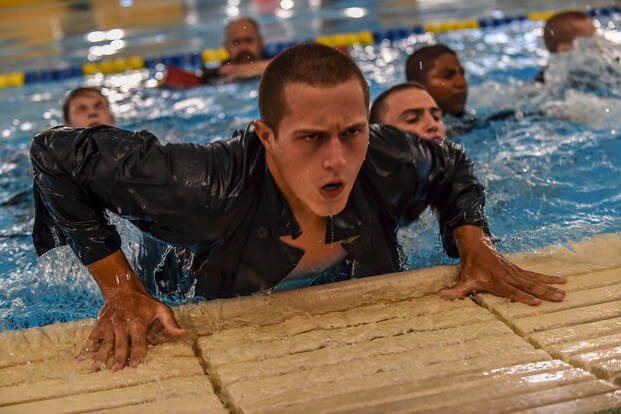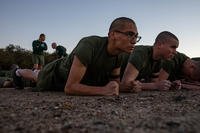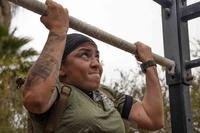Often, I receive emails from young men and women in their teens who ask about law enforcement or military careers when they get old enough to serve their country by doing such honorable professions.
I, however, wish most emails were like this future Marine. Too many times, young men and women start to prepare way too late for professions that require fitness tests. But more importantly, their lives or their buddies' lives may depend on their strength and fitness level. Here is an email from a young man who wants to become a Marine one day:
"I'm 16 years old and want to become a Marine. I just want to know how good my strength is, from your perspective:
- 80 push-ups w/o stopping
- 15 pull-ups
- 25 diamond push-ups w/o stopping
- Can run a mile in 5:25.
So how does it look, could I become a Marine?"
I think any branch of service or police department would be happy to allow you to serve. You definitely are getting into great shape. For the USMC, you should start to focus on getting that one-mile run up to three miles in about 18-19 minutes and get those pull-ups to 20 with ease. That will put you in above-average fitness levels upon arriving at boot camp.
But you have a few more years to prepare yourself, not only for service but for the rest of your life. Those are great PT scores; however, not all of your career depends on your physical abilities. You still should study hard, learn to be a team player by playing sports and figure out whether you want to enlist out of high school or go to college and become an officer.
There are great programs that will allow the military to pay for your college, either through the GI Bill and enlistment bonuses or ROTC and service academy programs. Regardless, your fitness is important and should be part of your daily life, just as brushing your teeth is.
Here are some tips to help you build your fitness levels to the level you should be on before you attend any basic training program (military or law enforcement).
Upper-body and lower-body endurance: The military and law enforcement indoctrination programs use calisthenics exercises, such as push-ups, sit-ups, pull-ups, squats, lunges and many more, not only to train hundreds of people at a time, but also to build muscular endurance. Long-lasting endurance will best help a recruit run longer, perform better on load-bearing marches/gear carries and fitness tests. Higher repetitions of these exercises will help your body last longer. See related articles on workouts:
Learn to swim: Swimming is one of the first survival skills we learn. In fact, many law enforcement agencies test in swimming if their jurisdiction is bordering significant water. Joining the military and not knowing how to swim can challenge your indoctrination training.
There are videos available to see how to swim, but the best way to learn is in person with a coach or swim instructor. Go to a local pool and seek lessons to learn basic skills. Swimming is also a great way to rest the legs after miles of running throughout the week.
Strength: Being strong is important too. It takes full body strength to carry or drag a buddy out of a danger area. From your grip muscles in your hands to your lower back, you need to work out by adding pull-ups, weight training and smart lower-back exercises to help add strength. See related articles for more ideas on training the entire body to be stronger:
Too often, I receive emails from people who need to lose 20 pounds quickly before they go to indoctrination training but had been exercising only for a few weeks. To be honest, to attend military or law enforcement training and perform well, you need to have a foundation of fitness for at least a year of sports and exercises for strength and endurance.
Otherwise, you will increase the likelihood of injuring yourself or have to attend "extra" workout sessions to catch up to the rest of your class. Both situations add stress to an already stressful environment and distract you from learning your profession to the best of your ability. So do not go until you are in shape. Otherwise, the instructors will take your fitness growth into their own hands and make your military and indoctrination tougher than it needs to be.
Stew Smith is a former Navy SEAL and fitness author certified as a Strength and Conditioning Specialist (CSCS) with the National Strength and Conditioning Association. Visit his Fitness eBook store if you're looking to start a workout program to create a healthy lifestyle. Send your fitness questions to stew@stewsmith.com.
Want to Learn More About Military Life?
Whether you're thinking of joining the military, looking for fitness and basic training tips, or keeping up with military life and benefits, Military.com has you covered. Subscribe to Military.com to have military news, updates and resources delivered directly to your inbox.



















